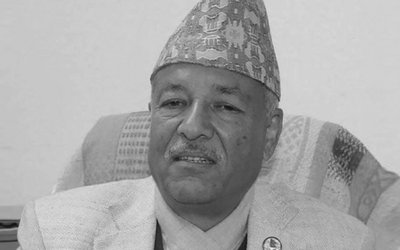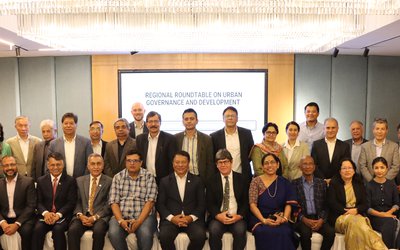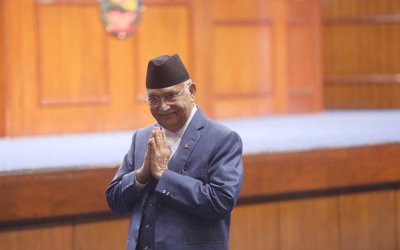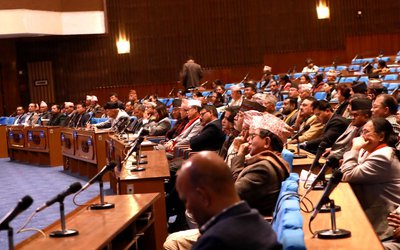
At a time when foreign aid is drawing debates, chief secretary Leelamani Paudyal’s 14-point directive has raised questions: Who is responsible to deal with the foreign aid policy matters?
Although he avoided comments on the directives by the chief secretary, Minister of Finance Dr. Ram Sharan Mahat has clearly upheld the stand that his ministry will decide on what kind of foreign aid Nepal required. Addressing a program to release a report on foreign aid, minister Dr. Mahat announced that his ministry will bring new foreign aid policy after intensive consultations with various stakeholders.
Finance minister Mahat’s indication is that his ministry is final and ultimate authority to decide on matters of foreign aid. If that is the case, what is the validity of chief secretary Paudyal’s 14 point directives issued to the secretaries, and referred to prime minister, finance minister and vice chairman of National Planning Commission?
According to the present civil service act, the role of chief secretary is to coordinate with the work of the government and authenticate the minutes of the cabinet meeting. Whether the chief secretary can issue such directives is questionable.
Some secretaries say Chief Secretary Paudyal can issue the directives for them.
Paudyal, issuing the directives through a letter on 7th April 2014, said that he realized the need of these directives after his four separate meetings with the executive directors of World Bank Group and vice president, executive directors of Asian Development Bank and director general of Asian Development Bank in March.
The Content
The directives stress not taking foreign loans and grants for small projects. Aid scatters resources. This leads to increase in the cost of supervision and evaluation, resulting in difficulties to maintain uniformity in quality of project works. Taking foreign loan and grant in small projects increases the cost and more spending on preparing report and document by consultants. He directed secretaries not to take any foreign and grants in small projects for many geographical regions asking them to take foreign aid in the areas generating direct employment opportunities and income generation, hydropower and infrastructures, road, medium and big scale infrastructure.
Consultants Hiring
Chief secretary Paudyal ordered not to hire any foreign or national consultants on a long term basis. He also directed the secretaries, if required, they should hire consultants for a short period or less than three months. He directed secretaries that they should not sign any agreement, with a provision to include foreign or national consultants in any projects.
He ordered secretaries that foreign or national consultants should be make accountable to their work, with provisions of punishment for their negligence. In case of failure of big projects, the provision should be made in the contract to claim compensation from consultants.
In his memo or directives, chief secretary Paudyal directed not to hire any consultant for construction of any infrastructure projects other than high dams, tunnel and ultra modern airports.
In a big or small project, technology transfer is taken as a part of the agreement. In the process of transfer of technology, consultants are given the responsibility to transfer and share their expertise.
Civil Service Training
In the training for civil servants, chief secretary sets conditions. Secretaries are asked to nominate the Nepal government appointee from civil service, chair or members of any institutions for foreign training. This will bar officials of government owned enterprises.
Civil servants should be barred from taking short term and long term trainings abroad under foreign aid- grant or loan. He directed secretaries to stop the employees from taking part in workshops and seminars.
He directed secretaries not to use foreign aid or grant money to purchase unnecessary equipment like luxury cars, fax and other such equipment.
Contradicting to his own direction, he, however, mentioned the need for capacity building of civil servants and development of human resources in civil service. This contradicts with his directives not to send any employees for training.
The chief secretary requested secretaries not to issue mobilization funds in advance in development projects. He directed to provide working capital for the contractors.
He also directed secretaries not to follow the guidelines issued by donors. He specifically asked his secretaries not to abide by the guidelines of Asian Development Bank and The World Bank in any projects and suggested to follow Nepal government’s guidelines. He directed secretaries to make foreign aid effectiveness a priority.
Although the letter directed to secretaries looks like a memo or just directives, he also ordered the cabinet secretariat to keep all records of bilateral agreements signed by different secretaries. He has made it clear in his letter that the secretaries who undermine the spirit of the directives will face departmental actions.
Implications
The finance ministry is responsible for deciding on foreign aid related issues. The chief secretary has no role regarding the agenda at all. This is likely to create more confusions within various ministries. Secretaries are already in confusion as to whether or how to report the matters related to foreign aid. The role of chief secretary is just that of a coordinator of the works which authenticate the decisions of the cabinet meeting. However, chief secretary Paudyal has encroached upon the areas outside his direct role. So far as secretaries are concerned, it is difficult for them to completely ignore the letter. Sent as a reference for implementation for foreign aid issues, it is likely to create more confusions than solve problems.
- IME GROUP: Expands Into Paper Industry
- Mar 24, 2025
- CPN UML: Instigated By India
- Mar 23, 2025
- ADB’S CHIEF ECONOMIST: Nepal Reduces Poverty
- Mar 11, 2025
- FM DR. DEUBA: A Successful Visit
- Mar 11, 2025
- MD GHISING: Target Of Personal Grudge
- Mar 09, 2025















